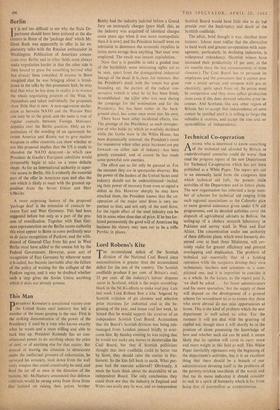Berlin
T is not too difficult to see why the State De- I partment should have been irritated at the dis- closure in Bonn of the 'package deal' which Mr. Dean Rusk was apparently to offer in his ex- ploratory talks with the Russian ambassador in Washington. Publication of American conces- sions. over Berlin and in other fields must always make negotiation harder in that the other side is then bound to press for something beyond what has already been conceded. If anyone in Bonn imagined that he was bringing about a break- down in the talks by this premature leak, he may find that what he has done in reality is to worsen the whole negotiating position of the West. In themselves and taken individually the proposals show little that is new. A non-aggression declar- ation as between NATO and the Warsaw Pact can only be to the good, and the same is true of regular contacts between Foreign Ministers' deputies over the Berlin question. Only an ex- amination of the wording of an agreement be- tween America and Russia not to give nuclear weapons to other countries can show whether or not this proposal implies that the US is ready to abandon the NATO deterrent—in which case President de Gaulle's European substitute would presumably begin to take on a more definite shape. As for an international authority to super- vise access to Berlin, this is evidently the essential part of the offer in American eyes and also the one which is likely to meet with the greatest op- position from the Soviet Union and Herr Ulbricht.
A more surprising feature of the proposed 'package deal' is the extension of contacts be- tween East and West Germany. This had been suggested before but only as a part of the pro- cess of reunification. Together with East Ger- man representation on the Berlin access authority this must appear to Bonn to come perilously near to de facto recognition of Pankow, and the with- drawal of General Clay from his post in West Berlin must have added to the unease felt by the Federal Government. However, some sort of recognition of East Germany by whatever name it is called, has become inevitable after the failure of the policy of waiting for the collapse of the Pankow regime, and it may be doubted whether such a step gives the Soviet Union anything which it does not already possess.


































 Previous page
Previous page